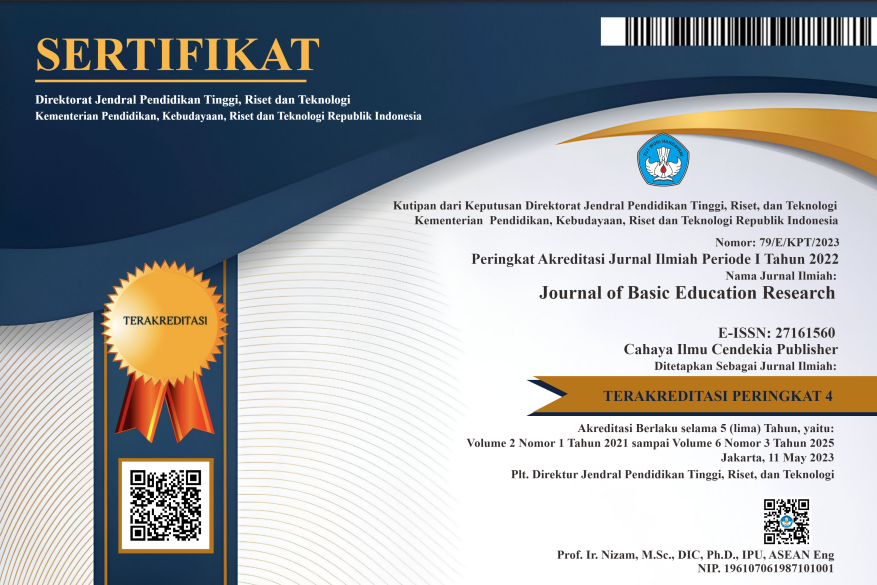Comparative Analysis of Electronic Modules with Print Modules in Social Studies Learning to See Environmental Care Character Indicators
Abstract
Research Objectives: This study has a purpose, namely to determine the indicators of environmental care characteristics. Where to use this type of quantitative research.
Research Methods: The type of research used is quantitative research. The sampling technique used in this study was total sampling and purposive sampling with a total of 18 students. The data analysis used in this research is descriptive and inferential statistics.
Main Findings: The results obtained from the significance value of SDS Suria Harapan on the use of printed modules and electronic modules based on local wisdom of ngubat padi, where there is a sig value of 0.605 for the printed module and 0.519 for the electronic module, based on these results it can be said that the data is normally distributed.
Novelty of Research: The novelty of this research lies in the electronic module and print module used by researchers which integrate with existing local wisdom so as to improve the character of caring for the environment. While the limitations of this study are that it only focuses on the fifth grade of elementary school
References
S. Uge., A. Neolaka., dan M. Yasin, “Development of Social Studies Learning Model Based on Local Wisdom in Improving Students' Knowledge and Social Attitude,” International Journal of Instruction, vol. 12, no. 3, pp. 375-388, 2019.
F. M. Nur, “Pemanfaatan sumber belajar dalam pembelajaran sains kelas V SD pada pokok bahasan makhluk hidup dan proses kehidupan,” JESBIO: Jurnal Edukasi Dan Sains Biologi, vol. 1, no. 1, 2012.
D. Y. Aditya, “Pengaruh Penerapan Metode Pembelajaran Resitasi terhadap Hasil Belajar Matematika Siswa,” SAP (Susunan Artikel Pendidikan), vol. 1, no. 2, 2016.
I. Anugraheni, “Analisa faktor-faktor yang mempengaruhi proses belajar guru-guru sekolah dasar,” Kelola: Jurnal Manajemen Pendidikan, vol. 4, no. 2, pp. 205-212, 2017.
M. Dhori, “Analisis Teori Belajar Behavioristik dalam Proses Belajar Mengajar di SD Negeri 7 Kayuagung,” HEUTAGOGIA: Journal of Islamic Education, vol. 1, no. 1, pp. 110-124, 2021.
E. I. Febriandari, “Pengaruh kreativitas guru dalam menerapkan ice breaking dan motivasi belajar terhadap hasil belajar siswa sekolah dasar," Briliant: Jurnal Riset Dan Konseptual, vol. 3, no. 4, pp. 485-494, 2018.
S. F. Jufri and A. Srimadona, “Analysis of the Implementation of the Discovery Learning Model and Its Effect on Creative Attitudes in Solubility Learning in Class XI MIA SMAN 2 Jambi City”, In. Sci. Ed. J, vol. 3, no. 3, pp. 78-85, 2022.
S. Agustin., S. Sumardi., dan G. Hamdu, “Kajian Tentang Keaktikan Belajar Siswa Dengan Media Teka Teki Silang Pada Pembelajaran IPS SD. PEDADIDAKTIKA: Jurnal Ilmiah Pendidikan Guru Sekolah Dasar, vol. 8, no. 1, pp. 166-176, 2021.
S. Rezkita., dan K. Wardani, “Pengintegrasian pendidikan lingkungan hidup membentuk karakter peduli lingkungan di sekolah dasar,” TRIHAYU: Jurnal Pendidikan ke-SD-an, vol. 4, no. 2, 2018.
S. Astuti, “Supervisi akademik untuk meningkatkan kompetensi guru di SD Laboratorium UKSW,” Scholaria: Jurnal Pendidikan Dan Kebudayaan, vol. 7, no. 1, pp. 49-59, 2017.
A. A. Nur, “Meningkatkan kompetensi pedagogik guru di SD yayasan Mutiara Gambut,” Jurnal Bahana Manajemen Pendidikan, vol. 2, no. 1, pp. 65-72, 2020.
I. U. W. Mulyono., E. H. Rachmawanto., A. Susanto., C. A. Sari., D. P. Prabowo., dan D. I. Ihya‘Ulumuddin, “Implementasi E-Learning Menggunakan Edmodo bagi Guru-Guru SD Kecamatan Cawas, Klaten,” ABDIMASKU: Jurnal Pengabdian Masyarakat, vol. 3, no. 1, pp. 56-64, 2020.
S. Syahrial., A. Asrial., D. A. Kurniawan., dan N. Kiska, “Improving Environmental Care Characters Through E-Modules Based on Local Wisdom Mangrove Ecotourism,” Jurnal Ilmiah Sekolah Dasar, vol. 5, no. 3, pp. 378-386, 2021.
H. Restiani and E. M. Sariniwati, “Implementation of the Think Pair Share (TPS) Cooperative Learning Model with a Scientific Approach to Student Learning Outcomes”, In. Sci. Ed. J, vol. 3, no. 3, pp. 86-91, 2022.
A. F. Noor., dan F. Sugito, “Multicultural Education Based in Local Wisdom of Indonesia for Elementary Schools in the 21st Century,” Journal of International Social Studies, vol. 9, no. 2, pp. 94-106, 2019.
N. Afiqoh., H. T. Atmaja., dan U. Saraswati, U. “Penanaman nilai kearifan lokal dalam pembelajaran sejarah pokok bahasan perkembangan Islam di Indonesia pada siswa kelas X IPS di SMA Negeri 1 Pamotan tahun ajaran 2017/2018,” Indonesian journal of history education, vol. 6, no. 1, pp. 42-53, 2018.
R. S. Kusuma, “Peran Sentral Kearifan Lokal Dalam Peningkatan Kualitas Pendidikan,” PEDAGOGIK: Jurnal Pendidikan, vol. 5, no. 2, pp. 228-239, 2018.
D. Rosala, “Pembelajaran seni budaya berbasis kearifan lokal dalam upaya membangun pendidikan karakter siswa di sekolah dasar,” Ritme, vol. 2, no. 1, pp. 16-25, 2018.
R. T. Yoshino., M. M. A. Pinto., J. Pontes., F. T. Treinta., J. F. Justo., dan M. M. Santos, “Educational Test Bed 4.0: a teaching tool for Industry 4.0,” European Journal of Engineering Education, vol. 45, no. 6, pp. 1002-1023, 2020.
S. Koul., dan B. Nayar, “The holistic learning educational ecosystem: A classroom 4.0 perspective,” Higher Education Quarterly, vol. 75, no. 1, pp. 98-112, 2021.
T. O. Kowang., M. F. Bakry., O. C. Hee., G. C. Fei., L. K. Yew., M. S. I. Saadon., dan C. S. Long, “Industry 4.0 Competencies among Lecturers of Higher Learning Institution in Malaysia,” International Journal of Evaluation and Research in Education, vol. 9, no. 2, pp. 303-310, 2020.
S. K. I. Pangestika, “Communication Skills: The Difference between Role Playing and Direct Learning Models for Social Artimatics”, Jor. Eva. Edu, vol. 3, no. 3, pp. 92-96, 2022.
S. Hadi, N. D. Kiska, and S. Maryani, “Analisis Problematika Pembelajaran Tematik Terhadap Karakter Rasa Ingin Tahu Peserta Didik di Sekolah Dasar”, In. Sci. Ed. J, vol. 2, no. 3, pp. 76-79, 2021.
Q. Luthfiah, D. Sartika, and M. Wulandari, “Metode Resitasi: Analisis Hasil Belajar Peserta Didik pada Pembelajaran Tematik Kelas IV Sekolah Dasar”, In. Sci. Ed. J, vol. 2, no. 3, pp. 84-88, 2021.
U. K. Pegu, “Information and communication technology in higher education in india: Challenges and opportunities,” International Journal of Information and Computation Technology, vol. 4, no. 5, pp. 513-518, 2014.
R. Rufii, “Developing module on constructivist learning strategies to promote students' independence and performance,” International Journal of Education, vol. 7, no. 1, pp. 18, 2016.
H. Sofyan., E. Anggereini., dan J. Saadiah, “Development of E-Modules Based on Local Wisdom in Central Learning Model at Kindergartens in Jambi City,” European Journal of Educational Research, vol. 8, no. 4, pp. 1137-1143, 2019
S. Z. Dewi., & I. Hilman, “Penggunaan TIK sebagai Sumber dan Media Pembelajaran Inovatif di Sekolah Dasar,” Indonesian Journal of Primary Education, vol. 2, no, 2, pp. 48-53, 2018.
A. Asrial., S. Syahrial., D. A. Kurniawan., dan L. Damayanti, “Comparison of Print Modules and E-Modules to the Tolerance Character of Students,” International Journal of Elementary Education, vol. 5, no. 2, 2021.
P. Leavy, “Research design: Quantitative, qualitative, mixed methods, arts-based, and community-based participatory research approaches”, 2017.
I. Islamy, “Penelitian Survei dalam Pembelajaran dan Pengajaran Bahasa Inggris,” Purwokerto: Universitas Muhammadiyah Purwokerto, 2019.
P. Prasetyono., H. Hendro., A. Abdillah., dan D. Fitria, “Academic Supervision toward Teacher’s Performance through Motivation as Intervening Variable,” Journal of Education and Learning (EduLearn), vol. 12, no. 2, pp. 188–197, 2018
I. Etikan., S. A. Musa., dan R. S. Alkassim, “Comparison of convenience sampling and purposive sampling,” American journal of theoretical and applied statistics, vol. 5, no. 1, pp. 1-4, 2016.
H. F. Ismail, “Statistika untuk penelitian pendidikan dan ilmu-ilmu social,” Kencana, 2018.
U. Ubaidillah., dan R. N. Efendi, “Perbandingan Antara Karakter Toleransi Terhadap Perkembangan Budaya Lokal Atau Ciri Khas Suatu Daerah Pada Muatan Pembelajaran IPS di Sekolah Dasar,” Journal of Basic Education Research, vol. 3, no. 2, pp. 48-56, 2022.
[36] Marisa, U., Yulianti, Y., & Hakim, A. R. (2020, November). Pengembangan E-Modul Berbasis Karakter Peduli Lingkungan di Masa Pandemi Covid-19. In Prosiding Seminar Nasional PGSD UNIKAMA (Vol. 4, No. 1, pp. 323-330).
J. N. S. Manik, “Penanaman Nilai Karakter Peduli Lingkungan Pada Siswa SD Negeri Pleburan 04 Semarang,” Jurnal Pendidikan Dasar, vol. 11, no. 1, pp. 87-93, 2020.
W. S. Aryanti, “Menjaga Kebersihan Sekolah dan Karakter Peduli Lingkungan bagi Murid MI/SD di Indonesia,” Jurnal Ilmiah Edukatif, vol. 6, no, 1, pp. 76-85, 2020.
A. Asrial., S. Syahrial., D. A. Kurniawan., dan J. Saputri, “Karakter Peduli Sosial: Komparasi Modul Elektronik dan Paper Modul Kearifan Lokal Ngubat Padi di Sekolah Dasar,” Prosiding Konferensi Nasional Pengabdian Kepada Masyarakat dan Corporate Social Responsibility (PKM-CSR), vol. 4, 866-877, 2021.
M. D. Zulkhi., dan M. Jannah, “Perbandingan Permainan Modern dan Permainan Tradisional Terhadap Muatan Pembelajaran IPS di Sekolah Dasar,” Journal of Basic Education Research, vol. 2, no. 2, pp. 42-46, 2022.
M. N. Akhmadi., dan H. Hartono, “Pengembangan Modul Digital Ips Materi Menghargai Peninggalan Sejarah Di Lingkungan Setempat. JIPI (Jurnal Ilmiah Penelitian dan Pembelajaran Informatika), vol. 7, no. 2, pp. 374-384, 2022.
Copyright (c) 2022 Yessi Isria Suhara, Nurul Delima Siska, Agus Fadilah Fadilah, Muhamad Andri Supriyadi

This work is licensed under a Creative Commons Attribution-NonCommercial 4.0 International License.
Authors who publish with this journal agree to the following terms:
- Authors retain copyright and acknowledge that the Journal of Basic Education Research is the first publisher licensed under a Creative Commons Attribution 4.0 International License.
- Authors are able to enter into separate, additional contractual arrangements for the non-exclusive distribution of the journal's published version of the work (e.g., post it to an institutional repository or publish it in a book), with an acknowledgment of its initial publication in this journal.
- Authors are permitted and encouraged to post their work online (e.g., in institutional repositories or on their website) prior to and during the submission process, as it can lead to productive exchanges and earlier and greater citation of published work.











